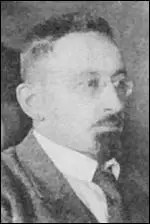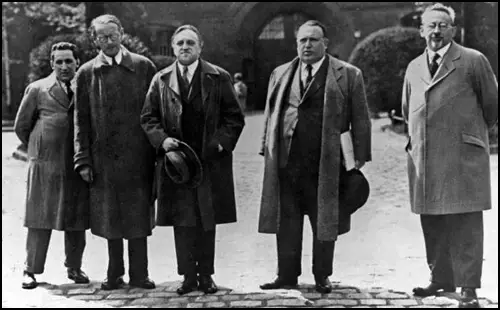Kurt Rosenfeld

Kurt Rosenfeld was born in Marienwerder, Germany, on 1st February 1877. He studied at University of Freiburg and the University of Berlin and during this period he joined the Social Democratic Party (SDP).
In 1905 he became a lawyer in Berlin and served as a SPD city councilor. He became a member of the Left Radicals section of the party. Others in the group included Karl Liebknecht, Rosa Luxemburg, Clara Zetkin, Franz Mehring, Karl Radek and Anton Pannekoek. (1)
Rosenfeld was opposed to Germany taking part in the First World War. Liebknecht was the only member of the Reichstag who voted against Germany's participation in the First World War. Paul Frölich, a supporter of Liebknecht in the SDP, argued: "It was clear to all the left-wing radicals in the party that although the failure of other parties in the International would not necessarily spell complete disaster, the failure of the German party as the leading socialist party would mean the victory of nationalism all along the line and the utter collapse of the International." (2)
In April 1917 left-wing members of the SDP formed the Independent Socialist Party (USPD). Members included Kurt Rosenfeld, Kurt Eisner, Karl Kautsky, Emil Barth, Julius Leber, Ernst Toller, Ernst Thälmann, Rudolf Breitscheild, Emil Eichhorn, Kurt Rosenfeld, Ernst Torgler and Rudolf Hilferding.
At the end of the war, Eisner, the leader of the USPD, became very popular. Konrad Heiden has pointed out: "On November 6, 1918, he (Kurt Eisner) was virtually unknown, with no more than a few hundred supporters, more a literary than a political figure. He was a small man with a wild grey beard, a pince-nez, and an immense black hat. On November 7 he marched through the city of Munich with his few hundred men, occupied parliament and proclaimed the republic. As though by enchantment, the King, the princes, the generals, and Ministers scattered to all the winds." (3
The following day Eisner led a large crowd into the local parliament building, where he made a speech where he declared Bavaria a Socialist Republic. Eisner made it clear that this revolution was different from the Bolshevik Revolution in Russia and announced that all private property would be protected by the new government. Eisner explained that his program would be based on democracy, pacifism and anti-militarism. The King of Bavaria, Ludwig III, decided to abdicate and Bavaria was declared a republic.
On 9th November, 1918, Kaiser Wilhelm II also abdicated and the Chancellor, Max von Baden, handed power over to Friedrich Ebert, the leader of the German Social Democrat Party. At a public meeting, one of Ebert's most loyal supporters, Philipp Scheidemann, finished his speech with the words: "Long live the German Republic!" He was immediately attacked by Ebert, who was still a strong believer in the monarchy and was keen for one of the his grandsons to replace Wilhelm. (4)
Kurt Rosenfeld became Minister of Justice in Eisner's government. However, on 21st February, 1919, Eisner was assassinated by Anton Graf von Arco auf Valley. It is claimed that before he killed the leader of the Independent Socialist Party he said: "Eisner is a Bolshevist, a Jew; he isn't German, he doesn't feel German, he subverts all patriotic thoughts and feelings. He is a traitor to this land." (5)
In 1920 Rosenfeld was elected to the Reichstag. Rosenfeld opposed the plan to merge the USPD with the SPD but in 1922 he accepted the inevitable and became one of the leaders of the SPD-Left and argued for a closer relationship with the German Communist Party (KPD). However, he upset Bolsheviks by defending members of the Socialist Revolutionary Party in 1922. (6)

On 24th February, 1933, Ernst Torgler, chairman of the German Communist Party (KPD), was arrested and charged with being involved in the Reichstag Fire. According to Detective-Inspector Walter Zirpins, who was given the task of investigating the fire, "three eye-witnesses saw van der Lubbe in the company of Torgler... before the fire. In view of van der Lubbe's striking appearance, it is impossible for all three to have been wrong." (7)
Kurt Rosenfeld, had been Torgler's lawyer for many years, and helped to organize his defence. He also represented Carl von Ossietzky, another strong opponent of fascism. However, like other socialists and communists in Germany, Rosenfeld fled the country when the Nazi government began arresting left-wing opponents of the regime and sending them to concentration camps. (8)
In August 1933, Torgler was forced to employ Alfons Sack. Rosenfeld moved to Paris where he helped to run a news agency called Inpress with "the sole aim of distributing uncensored news and information about Nazi Germany, untainted by Joseph Goebbels' Propaganda Ministry." (9)
Rosenfeld also worked with Willi Münzenberg in establishing the World Committee Against War and Fascism. The group, that included people such as Heinrich Mann, Charlotte Despard, Denis Nowell Pritt, Sylvia Pankhurst, Ellen Wilkinson, Vera Brittain, Storm Jameson, Ella Reeve Bloor, John Strachey, Norman Angell and Sherwood Anderson, established an investigation into the Reichstag Fire. (10)
The group also arranged for the publication of the book, The Brown Book of the Hitler Terror and the Burning of the Reichstag. With a cover designed by John Heartfield, the book argued that Hermann Göring was responsible for the Reichstag Fire. The historian A. J. P. Taylor, has pointed out: "Münzenberg and his collaborators were a jump ahead of the Nazis. Not only had they the evidence of the experts, demonstrating that van der Lubbe could not have done it alone and therefore implicating the Nazis; they also produced a mass of evidence to show how the Nazis had done it. The vital point here was an underground passage from Göring’s house to the Reichstag, which carried electric and telephone cables and pipes for central heating. Through this passage some S.A. men (Brown Shirts) were supposed to have entered the Reichstag." (11)
Rosenfeld moved to the United States and became president of the German American Emergency Committee and honorary president of the Latin American Committee of Free Germany.
Kurt Rosenfeld died in New York City on 25th September 1943.
Primary Sources
(1) Fritz Tobias, The Reichstag Fire: Legend and Truth (1963)
On the evening of 19 September, 1933, On 14th September 1933, the London Counter-Trial was formally opened in the courtroom of the Law Society. The inaugural address was delivered by Sir Stafford Cripps, to an audience including such famous men as H. G. Wells....
Arthur Garfield Hays tells us how the stolid and dignified Denis Nowell Pritt sat in the bathroom with a typewriter, while Dr Kurt Rosenfeld (Torgler's former counsel) and other members of the committee straightened out exhibits.
Student Activities
Who Set Fire to the Reichstag? (Answer Commentary)
Adolf Hitler's Early Life (Answer Commentary)
Adolf Hitler and the First World War (Answer Commentary)
Adolf Hitler and the German Workers' Party (Answer Commentary)
Sturmabteilung (SA) (Answer Commentary)
Adolf Hitler and the Beer Hall Putsch (Answer Commentary)
Adolf Hitler the Orator (Answer Commentary)
An Assessment of the Nazi-Soviet Pact (Answer Commentary)
British Newspapers and Adolf Hitler (Answer Commentary)
Lord Rothermere, Daily Mail and Adolf Hitler (Answer Commentary)
Adolf Hitler v John Heartfield (Answer Commentary)
The Hitler Youth (Answer Commentary)
German League of Girls (Answer Commentary)
Night of the Long Knives (Answer Commentary)
The Political Development of Sophie Scholl (Answer Commentary)
The White Rose Anti-Nazi Group (Answer Commentary)
Kristallnacht (Answer Commentary)
Heinrich Himmler and the SS (Answer Commentary)
Trade Unions in Nazi Germany (Answer Commentary)
Hitler's Volkswagen (The People's Car) (Answer Commentary)
Women in Nazi Germany (Answer Commentary)
References
(1) Chris Harman, The Lost Revolution (1982) pages 18-19
(2) Paul Frölich, Rosa Luxemburg (1972) page 204
(3) Konrad Heiden, Hitler: A Biography (1936) page 23
(4) Simon Taylor, Revolution, Counter-Revolution and the Rise of Hitler (1983) page 30
(5) Chris Harman, The Lost Revolution (1982) page 127
(6) Henning Grunwald, Courtroom to Revolutionary Stage: Performance and Ideology in Weimar Political Trials (2012) page 86
(7) Detective-Inspector Walter Zirpins, report on the Reichstag Fire (3rd March, 1933)
(8) Benjamin Carter Hett, Burning the Reichstag: An Investigation into the Third Reich's Enduring Mystery (2014) page 141
(9) V. E. Tarrant, The Red Orchestra (1998) page 150
(10) Fritz Tobias, The Reichstag Fire: Legend and Truth (1963) page 126
(11) A. J. P. Taylor, History Today (August, 1960)
